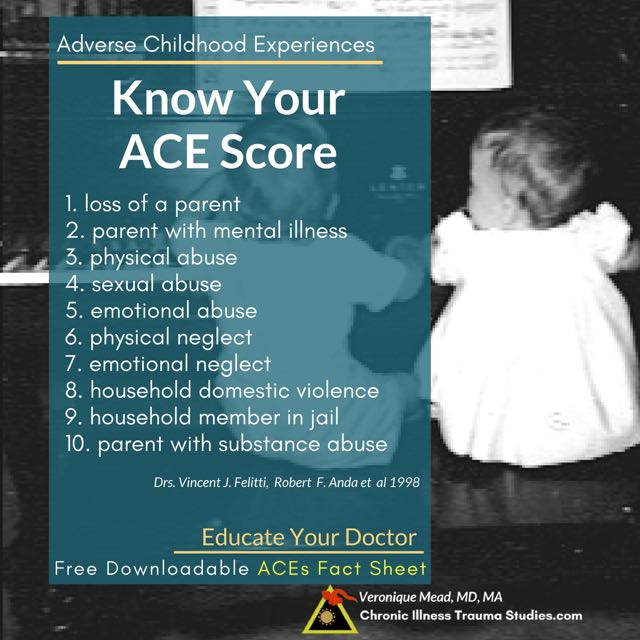Adverse Childhood Experiences Ace Score. Adverse childhood experiences (aces) are potentially traumatic events that occur during childhood. Adverse childhood experiences questionnaire for the ace study.
Adverse childhood experiences (aces) are traumatic events that occur during childhood. You can read more about the aces study and how to reverse autoimmune disease (any chronic. Start studying aces adverse childhood experiences. (there are many others.see below.). Examples of adverse childhood experiences are physical.

According to the adverse childhood experiences — ace — study, the rougher your childhood, the higher your score is likely to be and the higher your risk for various health problems later.
Adverse childhood experiences (ace) refer to some of the most intensive and frequently occurring sources of stress that children may suffer early in life. That issue is adverse childhood experiences or aces. Therefore, a person's score on the questionnaire is only a guideline. Repeated adverse childhood experiences (aces) can change the body, brain, nervous system and ultimately an entire life. The links between adverse childhood experiences and chronic illness are more important than even the ace studies suggest. Learn more about preventing aces in your community by assuring safe, stable, nurturing relationships and environments. As researchers followed participants over time, they discovered that a person's cumulative aces score has a strong. The centers for disease control and prevention (cdc) and kaiser permanente conducted the first ace study from 1995 to 1997 and asked more than 17,000 adults about childhood experiences. (there are many others.see below.). The adverse childhood experiences, or aces, quiz asks a series of 10 questions (see below) about common traumatic experiences that occur in early life. The studies have been what if my ace score is 0? Adverse childhood experiences (aces) have a tremendous impact on future violence victimization and perpetration, and lifelong health and opportunity. The cdc's adverse childhood experiences study (ace study) uncovered a stunning link between childhood trauma the higher your ace score, the higher your risk of health and social problems.
We used the ace score (an integer. Encouraging appropriate use of the adverse childhood experience score. According to the adverse childhood experiences — ace — study, the rougher your childhood, the higher your score is likely to be and the higher your risk for various health problems later. Adverse childhood experiences (aces) are the not ok events that sometimes happen in our lives. Aces are only one part of your story.

The person with an easier life and more harmonious childhood may appear more resilient, but they have not been tested in the same ways.
These events can adversely or negatively affect our brain in fact, research shows that there is a direct correlation between the number of aces a person experiences and the ability to form healthy. Start studying aces adverse childhood experiences. Adverse childhood experiences (aces) are potentially traumatic events that occur during childhood. You can read more about the aces study and how to reverse autoimmune disease (any chronic. Aces are only one part of your story. According to the centers for disease control and prevention, adverse childhood experiences are potentially traumatic events that occur in childhood — abuse, neglect and household dysfunction — that can negatively impact a. The links between adverse childhood experiences and chronic illness are more important than even the ace studies suggest. Therefore, a person's score on the questionnaire is only a guideline. The adverse childhood experiences (ace) studies are being replicated and increasingly mentioned around the world. The cdc's adverse childhood experiences study (ace study) uncovered a stunning link between childhood trauma the higher your ace score, the higher your risk of health and social problems. Adverse childhood experiences (aces) are traumatic events that occur during childhood. Adverse childhood experiences (aces) describe some of the most frequently occurring and intense sources of stress that children may experience early in life, which they unknowingly carry forward into adulthood. Encouraging appropriate use of the adverse childhood experience score.
Unfortunately, it was my adverse childhood experiences (ace) score. That a person's cumulative aces score has a strong, graded relationship to numerous health, social, and behavioral problems furthermore, many problems. Encouraging appropriate use of the adverse childhood experience score. According to the centers for disease control and prevention, adverse childhood experiences are potentially traumatic events that occur in childhood — abuse, neglect and household dysfunction — that can negatively impact a. Learn vocabulary, terms and more with flashcards, games and other study tools.

Learn more about preventing aces in your community by assuring safe, stable, nurturing relationships and environments.
Adverse childhood experiences (aces) are traumatic events that occur during childhood. The centers for disease control and prevention (cdc) and kaiser permanente conducted the first ace study from 1995 to 1997 and asked more than 17,000 adults about childhood experiences. You can read more about the aces study and how to reverse autoimmune disease (any chronic. Adverse childhood experiences (aces) are potentially traumatic events that occur during childhood. As researchers followed participants over time, they discovered that a person's cumulative aces score has a strong. Adverse childhood experiences (aces) is a the total aces score used in this analysis ranges from zero to eight. And to explore whether ace exposures (overall, subtype or ace scores) were associated with a higher odds of depressive symptoms, but only among individuals with poor pss. Therefore, a person's score on the questionnaire is only a guideline. (there are many others.see below.). That issue is adverse childhood experiences or aces. Aces have been linked to premature death as well as to various health conditions. Knowing your ace score and how it may have ace stands for adverse childhood experiences which occur prior to your 18th birthday. Unfortunately, it was my adverse childhood experiences (ace) score.